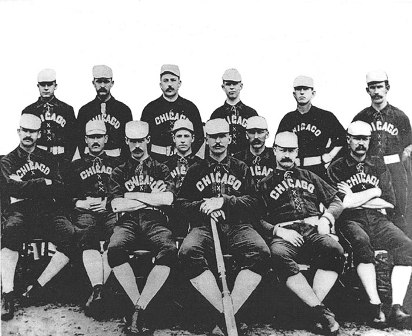Arm trouble ended Orval Overall’s career early. When he left baseball for the first time after the 1910 season he had a 104-66 record, won 20 games twice, and went to the World Series four times with the Chicago Cubs (3-1 in eight appearances).
After a visit to John D. “Bonesetter” Reese, a self-trained Youngstown, Ohio-based practitioner of alternative medicine, who while popular among many of the era’s major stars, was condemned by medical professionals. Despite being “healed,” Overall was unable to come to terms with the Cubs and sat out the 1911 season.
Remaining in his native California, Overall worked at the gold mine he owned with Cubs teammate Mordecai “Three Finger” Brown in Three Rivers and pitched for Stockton team in the “outlaw” California League. His success in California during the fall of 1911 gave the Chicago press hope he would return to the Cubs in 1912. The Chicago Inter Ocean said:
“Orval Overall’s arm seems to get better every time he pitches a game. Last week the former Cub whom Manager (Frank) Chance is trying to persuade to return to the West Side team struck out seventeen men twirling against the All-Sacramento team for Cy Moreing’s Stockton outlaws.”
Later in the fall Overall hurt his arm again. He returned to “Bonesetter” Reese in December and told The Youngstown Vindicator he was finished with organized baseball, and would “Confine himself to his mining business and with occasional independent ball.”
Overall pitched a few games for a semi-pro team in Visalia; thirty minutes from his mine.
In February of 1913, he petitioned the National Commission to reinstate him and declare him a free agent because the Cubs “omitted to send him a contract” in 1912. The commission granted his reinstatement but returned him to the Cubs.
Overall pitched in just 11 games, with a 4-5 record and .3.31 ERA; he was released to the San Francisco Seals in the Pacific Coast League (PCL) in early August.
Overall’s return to the West Coast was an event, and Seals fans even attempted to tell the club when the popular pitcher should make his first start. The San Francisco Chronicle said:
“Orval Overall, the famous California pitcher, who built up such a reputation with the Chicago Cubs, will pitch for San Francisco today against Venice (Tigers). A petition signed by sixty Seal fans was sent to (Manager) Del Howard yesterday, with the request that Overall’s first appearance be billed for Sunday afternoon.”
Howard chose to start Overall the day before the fans requested, nevertheless, the game drew a crowd of nearly 10,000 and The Chronicle said: “they gave him a reception long to be remembered.”
Overall gave up five runs, and was lifted in the ninth inning for a pinch hitter. The Seals lost 8-5 in 11 innings. He ended the season 8-9 with a 2.14 ERA.
At the end of the 1913 season, Overall announced his retirement. San Francisco fans were not convinced and said The Chronicle said he “was being counted upon to be one of the mainstays in the box.” But chose to take a job with Maier Brewing Company “in the South” (Venice, CA—still a separate city from Los Angeles at the time. The Maier family also owned the PCL’s Venice Tigers). San Francisco fans were not convinced, and there was speculation for the next four months that Overall would return.
Reporter L. W. Nelson, The San Francisco Call’s resident poet composed a verse to try to coax the pitcher back:
Ovie, Oh, Ovie
Ovie, oh, Ovie, come home to us now,
For the season is soon to begin,
And we need you, yes, badly, to show the folks how
The Seals, when they have you, can win!
Ovie, oh, Ovie, sign up with us quick,
Put your name on the contract from Cal,
For we know you can make all others looks sick,
If you pitch for our Seal crew, old pal!
Ovie, we know it is your fondest dream
To work down in Venice for Maier,
Midst the Milwaukee water, the lager and steam—
We know you would like it down there!
Ovie, oh, Ovie, sign up to play ball,
And don’t try your beer selling skill,
For the job in the brew’ry won’t help us at all,
But your pitching most certainly will!
(“Cal” was Seals owner James Calvin Ewing)
As late as March 1914 Overall hinted that he might return, but the pleas and the poem did not sway him.
He left the beer business after a year to manage his family’s large lemon and orange growing operation near Visalia, which would make him quite wealthy. He became a banker and dabbled in politics and competitive trap shooting. He died in 1947.





4 Responses to “Ovie, Oh, Ovie”